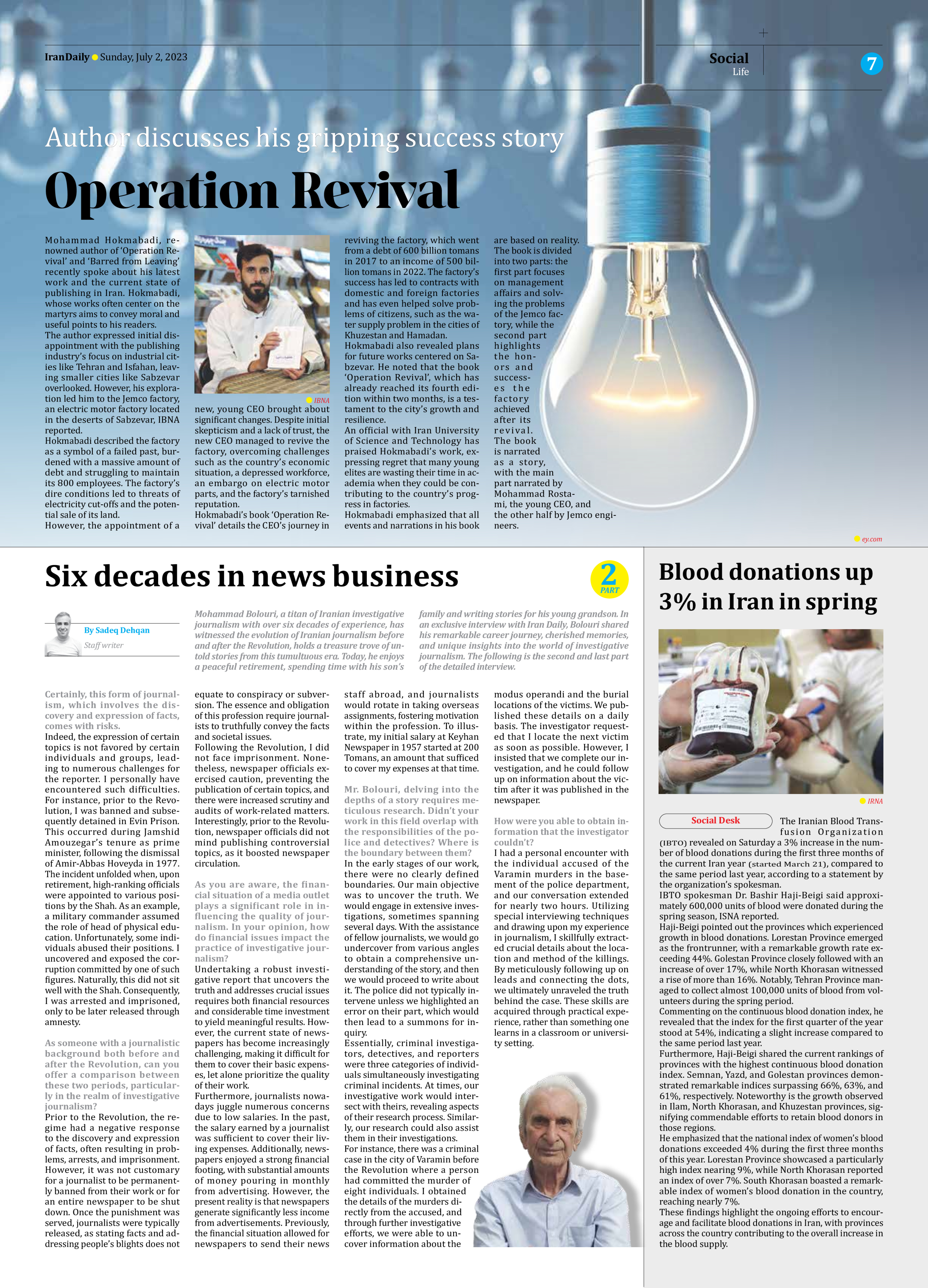
Six decades in news business
PART2
By Sadeq Dehqan
Staff writer
Mohammad Bolouri, a titan of Iranian investigative journalism with over six decades of experience, has witnessed the evolution of Iranian journalism before and after the Revolution, holds a treasure trove of untold stories from this tumultuous era. Today, he enjoys a peaceful retirement, spending time with his son’s family and writing stories for his young grandson. In an exclusive interview with Iran Daily, Bolouri shared his remarkable career journey, cherished memories, and unique insights into the world of investigative journalism. The following is the second and last part of the detailed interview.
Certainly, this form of journalism, which involves the discovery and expression of facts, comes with risks.
Indeed, the expression of certain topics is not favored by certain individuals and groups, leading to numerous challenges for the reporter. I personally have encountered such difficulties. For instance, prior to the Revolution, I was banned and subsequently detained in Evin Prison. This occurred during Jamshid Amouzegar’s tenure as prime minister, following the dismissal of Amir-Abbas Hoveyda in 1977. The incident unfolded when, upon retirement, high-ranking officials were appointed to various positions by the Shah. As an example, a military commander assumed the role of head of physical education. Unfortunately, some individuals abused their positions. I uncovered and exposed the corruption committed by one of such figures. Naturally, this did not sit well with the Shah. Consequently, I was arrested and imprisoned, only to be later released through amnesty.
As someone with a journalistic background both before and after the Revolution, can you offer a comparison between these two periods, particularly in the realm of investigative journalism?
Prior to the Revolution, the regime had a negative response to the discovery and expression of facts, often resulting in problems, arrests, and imprisonment. However, it was not customary for a journalist to be permanently banned from their work or for an entire newspaper to be shut down. Once the punishment was served, journalists were typically released, as stating facts and addressing people’s blights does not equate to conspiracy or subversion. The essence and obligation of this profession require journalists to truthfully convey the facts and societal issues.
Following the Revolution, I did not face imprisonment. Nonetheless, newspaper officials exercised caution, preventing the publication of certain topics, and there were increased scrutiny and audits of work-related matters. Interestingly, prior to the Revolution, newspaper officials did not mind publishing controversial topics, as it boosted newspaper circulation.
As you are aware, the financial situation of a media outlet plays a significant role in influencing the quality of journalism. In your opinion, how do financial issues impact the practice of investigative journalism?
Undertaking a robust investigative report that uncovers the truth and addresses crucial issues requires both financial resources and considerable time investment to yield meaningful results. However, the current state of newspapers has become increasingly challenging, making it difficult for them to cover their basic expenses, let alone prioritize the quality of their work.
Furthermore, journalists nowadays juggle numerous concerns due to low salaries. In the past, the salary earned by a journalist was sufficient to cover their living expenses. Additionally, newspapers enjoyed a strong financial footing, with substantial amounts of money pouring in monthly from advertising. However, the present reality is that newspapers generate significantly less income from advertisements. Previously, the financial situation allowed for newspapers to send their news staff abroad, and journalists would rotate in taking overseas assignments, fostering motivation within the profession. To illustrate, my initial salary at Keyhan Newspaper in 1957 started at 200 Tomans, an amount that sufficed to cover my expenses at that time.
Mr. Bolouri, delving into the depths of a story requires meticulous research. Didn’t your work in this field overlap with the responsibilities of the police and detectives? Where is the boundary between them?
In the early stages of our work, there were no clearly defined boundaries. Our main objective was to uncover the truth. We would engage in extensive investigations, sometimes spanning several days. With the assistance of fellow journalists, we would go undercover from various angles to obtain a comprehensive understanding of the story, and then we would proceed to write about it. The police did not typically intervene unless we highlighted an error on their part, which would then lead to a summons for inquiry.
Essentially, criminal investigators, detectives, and reporters were three categories of individuals simultaneously investigating criminal incidents. At times, our investigative work would intersect with theirs, revealing aspects of their research process. Similarly, our research could also assist them in their investigations.
For instance, there was a criminal case in the city of Varamin before the Revolution where a person had committed the murder of eight individuals. I obtained the details of the murders directly from the accused, and through further investigative efforts, we were able to uncover information about the modus operandi and the burial locations of the victims. We published these details on a daily basis. The investigator requested that I locate the next victim as soon as possible. However, I insisted that we complete our investigation, and he could follow up on information about the victim after it was published in the newspaper.
How were you able to obtain information that the investigator couldn’t?
I had a personal encounter with the individual accused of the Varamin murders in the basement of the police department, and our conversation extended for nearly two hours. Utilizing special interviewing techniques and drawing upon my experience in journalism, I skillfully extracted crucial details about the location and method of the killings. By meticulously following up on leads and connecting the dots, we ultimately unraveled the truth behind the case. These skills are acquired through practical experience, rather than something one learns in a classroom or university setting.







